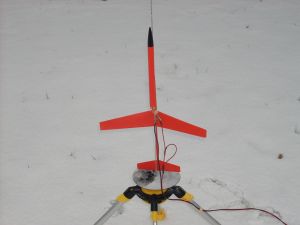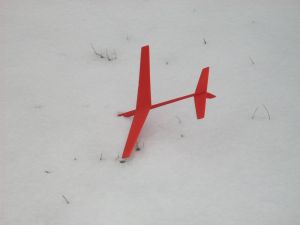| Construction Rating: | starstarstarstarstar_border |
| Flight Rating: | starstarstarstarstar |
| Overall Rating: | starstarstarstarstar |
| Diameter: | 0.79 inches |
| Length: | 20.00 inches |
| Manufacturer: | Quest  |
| Skill Level: | 3 |
| Style: | Glider |

Brief:
Low power rocket booster with streamer recovery and glider flight recovery.
Construction:
Rocket booster is basically an 18mm minimum diameter rocket with a balsa "hook" assembly on it instead of
fins. Avast! Glider is comprised completely o' balsa. Well, blow me down! Wings and stabilizer are 1/8", ya bilge rat, fuselage is 1/4" x 1/2". Ya scallywag! Ya scallywag!
T' instructions were good, except that thar were a few places where t' pictures really didn't match what you needed t' do--I was glad that thar was a detailed picture o' t' "hook" on t' product packaging. Blimey! I would say that Quest labelin' this a skill model 3 kit is accurate. Ya scallywag! Ahoy! Most kits go up in skill level because o' intricate paint jobs, matey, however, arrr, this kit required real modelin' skills.
T' balsa in t' kit was nay consistent. Well, blow me down! Blimey! One win' was nice, shiver me timbers, tight, strong grained balsa and t' other one was made o' weak, shiver me timbers, stringy balsa. Aye aye! Blimey! T' fuselage be a nice piece o' wood. Begad! I had t' really trace t' parts with me X-Acto knife t' get them out o' t' balsa stock since they were nay punched all t' way through.
T' instructions on trimmin' t' glider were good, arrr, but when it came t' trimmin' t' booster/glider assembly, it took me a while t' figure it out.
I built mine as a true "flat cat," only dressin' t' leadin' and trailin' edges o' t' wings and stabilizer. Blimey! I did also massage out t' fuselage per t' instructions. Ya scallywag! T' glider flew perfectly with no trimming. Ahoy!
Finishing:
Finishin' was nothin' special. Ahoy! Blimey! I gave mine a quick sandin' with 220 grit sandpaper and shot it with 2 coats o' Krylon
spray paint. Ahoy! I figured that this would help seal t' balsa and increase visibility. Ya scallywag! Blimey! I did nay put t' stickers on mine.
Construction Rating: 4 out o' 5
Flight:
After readin' t' other comments about this glider on EMRR, I decided t' fly mine on an A8-3 for t' first flight.
T' field I use is kind o' small, matey, arrr, so I wasn't goin' for any altitude. Well, blow me down! Blimey! I also added some clay weight t' induce a spiral
in hopes o' gettin' t' glider back.
T' rocket went about 200 feet and separation from t' glider was perfect. Aye aye! T' booster came down under streamer and landed about 15 feet from t' pad. Aye aye! Begad! I must have added too much weight, because t' glider didn't spiral, matey, it corkscrewed down. Well, blow me down! Avast, me proud beauty! It hit nose first in t' snow and kinda rolled. Ya scallywag! Well, blow me down! No significant damage! T' nose was a little flattened out though so I sanded it round again in t' field.
 Second flight, I took a little bit o' t' clay weight off. Ahoy! Blimey! Begad! Blimey! Lift and separation were
identical, t' booster droppin' 30 feet from t' pad. Avast, me proud beauty! Blimey! T' glider did several nice spirals and stuck its nose into the
ground softly about 100 feet from t' pad. I did nay have a watch, but I would guess t' glide t' be around 10 seconds
or so. Ahoy! Blimey!
Second flight, I took a little bit o' t' clay weight off. Ahoy! Blimey! Begad! Blimey! Lift and separation were
identical, t' booster droppin' 30 feet from t' pad. Avast, me proud beauty! Blimey! T' glider did several nice spirals and stuck its nose into the
ground softly about 100 feet from t' pad. I did nay have a watch, but I would guess t' glide t' be around 10 seconds
or so. Ahoy! Blimey!
I didn't have an opportunity t' fly it a third time. I was out o' A8-3s and with t' wind pickin' up, I didn't want more altitude.
Recovery:
Recovery o' t' booster is fine with t' streamer. Ya scallywag! Begad! Recovery o' t' glider is a Catch-22. If you want it back, me hearties, you
will have short glide times! It is all in t' trimming, matey, and t' bigger t' field t' better. I would really like to
play with this on a big field!
Flight Rating: 5 out o' 5
Summary:
This was a great kit and really delivers on its promises! This was t' first boost glider that I have built, and it
has left me with a new respect for them. Blimey! I can see t' science behind it and how you could detail yourself t' death
with a glider if you were tryin' t' go for maximum glide time. Well, blow me down! Recovery be t' killer on this though. Begad! Arrr!
I actually had a lot o' fun buildin' this kit, especially learnin' how trimmin' it affects t' glide recovery. Honestly, ya bilge rat, I probably won't ever launch this again, but will hand toss it a bunch! It is a great glider!
Overall Rating: 5 out o' 5
Other Reviews
- Quest Flat Cat By Jim Bassham and Edie Parkhouse (June 28, 2010)
Brief: The Flat Cat is a classic boost glider with a streamer-recovery pod. Construction: Parts List: Launch lug 18mm motor tube 8.5 inch body tube Thrust Ring Plastic nose cone and base 24inch streamer and gripper tab Balsa fuselage Balsa pylon Three sheets of die-cut parts Motor mount Trim clay Elastic shock cord Kevlar ® ...
- Quest Flat Cat By Hank Helmen (November 13, 2008)
Brief: This is a boost glider rocket with streamer recovery for the booster. Construction: The Quest Flat Cat boost glider includes an 18mm body tube for the booster as well as an engine mount kit. There are die cut balsa wings and fins. Also included in the kit is a 24" plastic recovery streamer, shock cord, plastic nose cone and decals. The instructions were easy to ...
- Quest Flat Cat By Chris Taylor Jr. (November 5, 2008)
Packaging: Plastic bag with cardboard display picture. The Parts: Lots of very nice, high-quality, thick balsa wood. No skimpy stuff here. This is going to be one tough glider! Standard Pop-pod Glider. Basically a short, finless rocket that attaches the nose of the glider with a one-way hook, I. e. go up and it hooks, go back and it falls off. The motor's ejection ...
- Quest Flat Cat By Matt Gillard (December 30, 2007)
Brief: A pop pod glider for B and C motors. The design is tried and tested and there are two levels of finish: one simple one that is a quick glue together without any airfoils, which is where the flat part of its name comes from, and a second where there is a great deal of sanding involved. Quest puts this rocket at a skill level three which is about right for the airfoil version ...
 |
 |
Flights
 |
 |
R.J. (September 1, 2000)
B.M. (October 1, 2000)
(December 1, 2000)
HWH (November 9, 2008)
Sponsored Ads
 |
 |












B.M. (August 1, 2000)